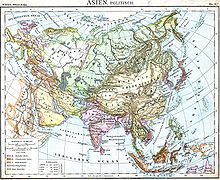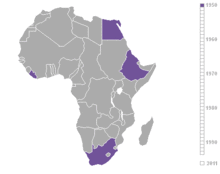Decolonization
![]()
This article or subsequent section is not sufficiently supported by evidence (e.g., anecdotal evidence). Information without sufficient evidence may be removed in the near future. Please help Wikipedia by researching the information and adding good supporting evidence.
the longer and quite controversial/questionable text proves only 2 single facts. andy_king50 (discussion) 15:37, 1. Nov. 2018 (CET)
Decolonization is understood to be the processes of detachment leading to the end of colonial rule, as well as the social, economic and cultural developments following the attainment of state independence.
The term was coined in 1932 by the political scientist Moritz Julius Bonn. The terms decolonization and decolonization as well as decolonization and decolonization are used synonymously.
In addition to the processes of detachment of the colonies from their colonial powers, the term "decolonization" also encompasses the social and cultural dimensions within the colonized peoples and states, as well as the global changes at the level of the world economy and world politics. Overall, "decolonization" thus includes three levels that influence each other: Colonial power, colony, and world political development.
The Second World War was the main catalyst of a worldwide decolonization in which India (1947), Indonesia (1949) and later the colonies in Africa gained their independence. In the course of this development, 120 colonies and dependent territories became independent from the 1940s to 2002. The states of Central Asia gained their independence with the collapse of the Soviet Union (1991).

Colonial powers and colonial territories 1945
Term
Moritz Julius Bonn introduced the term in 1932 in his work Economics and politics as follows: "All over the world a period of countercolonization began, and decolonization is rapidly proceeding."
In a broader sense, decolonization is a process that began long before the culmination of the division of the world among colonial powers during the imperialist period, notably with the War of Independence of the United States of America (1775-1783) and the independence of the Spanish colonies in the American double continent (1813-1824).
History
America
→ Main article: Decolonization of the Americas
Asia
The decolonization of the 20th century is already rooted in the time of the First World War. The development began in Asia, especially in India. There, a national movement had already formed early on, which increasingly saw itself as progressive-anticolonial. After the First World War, Mahatma Gandhi became its charismatic leader. As an organizational bracket, the Indian National Congress, founded as early as 1885, gained more influence in the 1920s. The fact that this Hindu national movement had neither a concept for dealing with other religions nor with the British colonial administration led to conflicts also within the movement, which intensified from the end of the 1920s. After initial attempts at suppression, the British colonial administration shifted to supporting factions that were willing to cooperate. The national movement responded by suppressing currents within its ranks that were unwilling to compromise with the British. In addition, the intolerance of the National Congress towards Muslims and the personality cult around Gandhi intensified.
In Southeast Asia, the movements were able to tie in with pre-colonial statehood and to use religions as cores of identification. Initially, only small groups of educated people pursued the national idea. From 1920 to 1930, the rise of national movements to larger organizations took place in all Southeast Asian states, most of which were initially oriented toward cooperation with the colonial authorities. In the wake of the Great Depression, beginning in 1929, there was a radicalization that led to uprisings, revolts, party formations, and eventually colonial crises. During World War II, the Japanese occupation forces used pan-Asian propaganda to promote independence movements in South and Southeast Asia, which continued after the Japanese defeat. In Burma, Laos, Vietnam, Cambodia, and especially Indonesia, the Japanese left their weapons to the independence fighters who resisted the restoration of British, French, and Dutch colonial rule after 1945.
Central Asia had been colonized by the Russian Tsarist Empire from the 18th century. Later, the Turkestan General Government (1868) and the General Government of the Steppe (1882) were established on this territory. Especially today's Kazakhstan developed in the course of the Russian conquest into a settlement colony of Europeans - namely Russians and Ukrainians as well as, in smaller numbers, Germans - whose share of the population at times exceeded that of the Kazakhs. (The proportion of the German population increased sharply in 1941 in the course of the forced resettlement of the Volga Germans). After the founding of the Soviet Union, independent Soviet republics were established in Central Asia in the 1920s, and the various Turkic languages, as well as Tajik, were elevated to official languages alongside Russian in the respective Soviet republics, although Russian continued to dominate public life. With the collapse of the Soviet Union in 1991, Kazakhstan, Kyrgyzstan, Uzbekistan, Turkmenistan and Tajikistan gained their state independence.
Russian colonization of the South Caucasus had also begun in the 18th century; however, this area was never increasingly settled by Russians. In 1918, Georgia, Armenia and Azerbaijan briefly gained their independence with the end of the tsarist era. However, Armenia and Azerbaijan were occupied by the Red Army by 1920, Georgia by 1921, and annexed by the Soviet Union in 1922. They initially formed the Transcaucasian Soviet Federative Socialist Republic, but in 1936 each became an independent Soviet republic. Only with the disintegration of the USSR did the three countries gain their final independence in 1991.
In contrast, the North Caucasus, which was also colonised by the Russian Tsarist Empire from the 18th century onwards, but was only finally brought under Russian control in the course of the Caucasian War (1817-1864), still forms an integral part of the Russian Federation as the North Caucasus Federal District. However, the region has been rocked by unrest since 1991, which escalated into the First Chechen War (1994-1996) and the Second Chechen War (1999-2009). Chechnya's secession from Russia during the First Chechen War was reversed during the Second Chechen War.
Siberia, which had already been colonised by Russia from the 16th century onwards, is also still part of the Russian territory. Here there are efforts towards greater federalisation.
Africa
→ Main article: Decolonization of Africa
In Africa, the development was similar to that in Asia, but later. Politicization and formation into associations and parties did not occur until after 1945, and their leaders, while traditional, drew on Western ideologies. The elites were much smaller than in Asia and more firmly linked to the institutions of the colonial system. One of the earliest such movements formed in Ghana under Kwame Nkrumah from 1947. The British attempt to bring in forces willing to cooperate, similar to those in India, led to a strengthening of Nkrumah against internal opponents. In Nigeria, no rallying movement developed, but rather various contending regional nationalisms, as was typical of nationalism in most African countries. In many cases, tribal associations formed only during decolonization. The only exceptions were where charismatic figures (Ghana, Kenya) or reference to European ideologies (Tanganyika) emerged. The year 1960, when most African states gained independence, is considered the key year of Africa's decolonization and is referred to as the "African Year".
Results and follow-up developments
Within the two decades following the Second World War, 50 colonies were granted formal independence. The foundation for this had been laid during the war, when the colonial powers were unable to secure their control over the colonies either financially, politically or militarily. Added to this were the "rewards" promised during the war in the form of greater self-determination for the participation of native troops from the colonies in the war.
The social agents of decolonization were mostly local elites who occupied lower positions in the colonial administration and were frustrated by a lack of opportunities for advancement. Boundaries were drawn in Africa without regard to ethnic settlement areas. In quite a few states, people of different ethnicities were grouped together. This fragmentation of ethnic groups was the cause of ethnic conflicts, most of which continue to this day.
After the withdrawal of the colonial states, many former colonies experienced fierce, often warlike conflicts within the national movements or between different ethnic groups. Where the national movement had a charismatic leader figure, a personality cult often developed. There was usually no institutional separation between the state and the leadership. Initial multiparty systems often turned into one-party rule, supporting the autocrat. The most important power factor was usually the military, which was based on a European-trained officer corps and in many cases dominated by one ethnic group.
Often, political, socio-cultural and economic ties to the former colonial power remained largely intact. To this day, the former colonial powers feel closely connected to their colonies and claim a special right of co-determination for these states at the international level. At the same time, many former colonies remain dependent on the former colonial power as so-called developing countries.
For this reason, many disputes remain even after the colonial period. It is "about the reshaping of coexistence, about feelings of homeland and identity, nationalism, migration and tourism, new slavery and raw materials for our digital future". - Deutschlandradio dedicated a forum to this issue and the questions it raises with its three programs in 2020: Under the title "Eine Welt 2.0 - Dekolonisiert euch!" (A World 2.0 - Decolonize yourselves!), a whole series of contributions was published in which experts and academics as well as listeners had their say. The contributions appeared in the broadcast format "Think Tank", a project in which listeners have the opportunity to determine the topic beforehand.

Asia in 1899

Chronology of the independence of African countries
Search within the encyclopedia